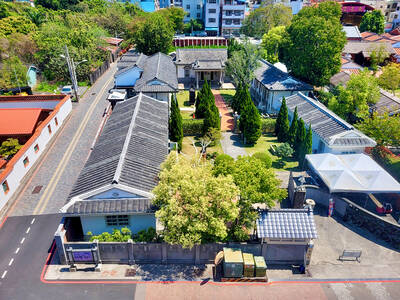Mongolian hot pot restaurants have become so popular in East Asia that one franchise is even listed on the Hong Kong Stock Exchange. This, perhaps, explains the frequent crowds lining up outside Little Mongolian (小蒙牛麻辣蒙古火鍋), a swanky new restaurant that recently opened across the street from Taipower Building (台電大樓) in Gongguan (公館).
After tasting the broths, it’s easy to understand why reservations are generally required. Two varieties of soup are on offer: Mongolian-spicy and non-spicy (a chicken-based broth with Chinese medicinal herbs). Our party of two ordered both, which came in a metal bowl separated by a divider.
The server explained that the broths are made from scratch and infused with fresh and dried herbs and spices. Whole red chili peppers, cardamom, cumin and garlic were among the items that swam among chunks of ginger, slices of spring onion and “secret” ingredients. The spicy half was milder than its mala (麻辣) cousin, though didn’t suffer as a result, while the clear broth didn’t taste like Chinese medicine, thankfully.
Little Mongolian differs from the typical all-you-can-eat Taiwanese hot pot restaurant. Rather than store all the ingredients in open refrigerators, staff bring the dishes out as you order. Aside from the meat, which included slices of Angus beef, pork tenderloin and mutton, we also order four combo platters.
This was a mistake. The seafood platter arrived heaped with shrimp, crab meat, cuttlefish, clams and mussels, and the vegetable platter came with cabbage, pumpkin, melon, lettuce and tomatoes. On top of the four meat dishes and plates of assorted mushrooms and dumplings that we ordered, it was far too much food for two people. Such waste is enough to induce a fit of green guilt.
Little Mongolian’s interior is somewhat cramped, at least until you sit down. The spacious high-backed booths sit four to six comfortably and offer a reasonable degree of privacy.
The price tag — NT$399 for lunch and NT$450 for dinner, plus a 10-percent service charge — includes bottled soft drinks, juices, coffee and iced tea. Although we couldn’t finish the hot pot, we still managed to shovel down a few scoops of Movenpick ice cream.
Little Mongolian also has a location at 2F, 20, Nanjing E Rd Sec 2, Taipei City (台北市南京東路二段20號2樓). Tel: (02) 2536-1333.

April 28 to May 4 During the Japanese colonial era, a city’s “first” high school typically served Japanese students, while Taiwanese attended the “second” high school. Only in Taichung was this reversed. That’s because when Taichung First High School opened its doors on May 1, 1915 to serve Taiwanese students who were previously barred from secondary education, it was the only high school in town. Former principal Hideo Azukisawa threatened to quit when the government in 1922 attempted to transfer the “first” designation to a new local high school for Japanese students, leading to this unusual situation. Prior to the Taichung First

Chinese Nationalist Party (KMT) Chairman Eric Chu (朱立倫) hatched a bold plan to charge forward and seize the initiative when he held a protest in front of the Taipei City Prosecutors’ Office. Though risky, because illegal, its success would help tackle at least six problems facing both himself and the KMT. What he did not see coming was Taipei Mayor Chiang Wan-an (將萬安) tripping him up out of the gate. In spite of Chu being the most consequential and successful KMT chairman since the early 2010s — arguably saving the party from financial ruin and restoring its electoral viability —

The Ministry of Education last month proposed a nationwide ban on mobile devices in schools, aiming to curb concerns over student phone addiction. Under the revised regulation, which will take effect in August, teachers and schools will be required to collect mobile devices — including phones, laptops and wearables devices — for safekeeping during school hours, unless they are being used for educational purposes. For Chang Fong-ching (張鳳琴), the ban will have a positive impact. “It’s a good move,” says the professor in the department of

Toward the outside edge of Taichung City, in Wufeng District (霧峰去), sits a sprawling collection of single-story buildings with tiled roofs belonging to the Wufeng Lin (霧峰林家) family, who rose to prominence through success in military, commercial, and artistic endeavors in the 19th century. Most of these buildings have brick walls and tiled roofs in the traditional reddish-brown color, but in the middle is one incongruous property with bright white walls and a black tiled roof: Yipu Garden (頤圃). Purists may scoff at the Japanese-style exterior and its radical departure from the Fujianese architectural style of the surrounding buildings. However, the property